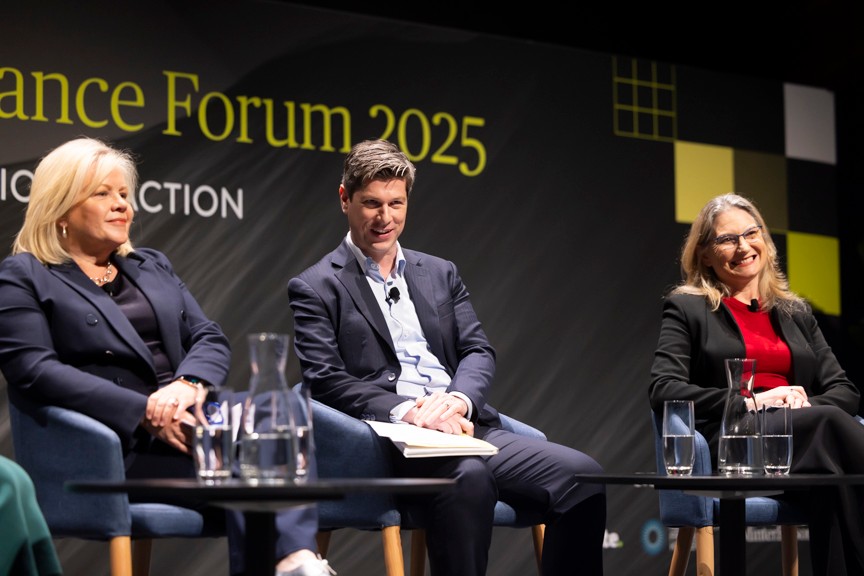Clean energy and productivity in focus at Treasurer's Roundtable
This week, the Treasurer’s Economic Reform Roundtable is underway in Canberra, with clean, affordable energy high on the agenda as a key driver of national productivity, alongside broader environmental approval reforms.
Productivity and the energy transition were also in focus at the AICD’s Climate Governance Forum 2025 in Melbourne, which drew an audience of around 1,400 in its fourth year. The event on 8 August highlighted progress in boardroom practice, and ASIC used the occasion to launch a new Reporting and Audit Update newsletter to support companies adapting to the mandatory climate reporting regime.
Keynote speaker Tom Pockett MAICD, Chair of IAG and Stockland, urged directors to bring the same discipline to climate disclosures as financial accounts: 'Treat the disclosures with a prospectus mindset: Qualify, assure, and have plenty of legal advice.'
Also in this newsletter:
- Treasury calls for input on climate transition planning
- Our top takeaways from this year’s Climate Governance Forum
- Market developments: Energy company earnings highlight transition pressures; New South Wales lifts clean energy targets; review of ASX-listed companies finds climate-related disclosure in annual reports rising.
Clean energy and productivity in focus at Economic Reform Roundtable
Recent findings from the Productivity Commission’s interim report Investing in cheaper, cleaner energy and the net zero transformation remain central to the policy conversation, including at this week’s Economic Reform Roundtable.
Released earlier this month, the report sets out priority reforms to deliver lower-cost, cleaner energy and accelerate the net zero transition – one of five pillars identified for the productivity agenda. It calls for nationally consistent, technology-neutral policies to reduce emissions at least cost, echoing the AICD’s advocacy for clear and enduring frameworks. Key recommendations include expanding the Safeguard Mechanism, phasing out technology-specific incentives, streamlining approvals for clean energy projects, and introducing a climate resilience star-rating system to capture potential climate impacts.
Speaking at the Climate Governance Forum last week, Productivity Commissioner Barry Sterland highlighted the detailed policy work still required, noting that current policy signals for the electricity market 'stop in 2030’, leaving a gap in post-2030 planning. Australia’s 2035 emissions reduction target is expected to be announced in the coming months. Submissions on the interim report close 15 September 2025. If you have any comments on the report, please email: policy@aicd.com.au. Read AICD’s earlier submission here.
10 key takeaways from Climate Governance Forum 2025
This year’s AICD climate forum brought together directors, experts, policymakers and other stakeholders for a mix of plenaries, keynotes and, for the first time, simultaneous roundtable discussions. Across these sessions, discussions highlighted the growing maturity of Australian boards in approaching the transition.
Our key takeaways:
- Physical climate risks play out locally
- Climate belongs in core strategy, not just sustainability
- Ambitious targets can drive organisational focus
- Treat climate disclosures with a 'prospectus mindset'
- Domestic policy stability helps planning, but global volatility keeps the transition nonlinear
Read our article for the top 10 Forum insights.
Why transition planning is in the spotlight
At the Climate Governance Forum, Tim Stutt from HSF Kramer observed that Australia’s early move on mandatory climate reporting – ahead of much larger jurisdictions – has created what some are calling a ‘tail wags dog’ situation, where Australia’s comparatively small market is nonetheless influencing global practice. This dynamic presents both opportunities and challenges: while Australian directors’ approaches could help shape international practice, large multinationals still face the difficulty of reporting differently here than in other markets.
The new AICD–ACSI Governing for Net Zero guide shows how well-embedded transition strategies can strengthen disclosures while building resilience and long-term value. As organisations revisit their plans, many are finding that clarifying strategy, targets and delivery pathways makes reporting more consistent and useful to investors, while helping boards navigate an increasingly complex operating environment. Read our article.
As part of its Sustainable Finance Roadmap, the Government is consulting on best practice climate-related transition planning, with guidance to be released by the end of 2025. The consultation paper cites the new AICD–ACSI transition planning resource and aims to support international alignment to improve comparability of transition plans. Submissions close on 24 September. We invite feedback from members to inform AICD’s submission: policy@aicd.com.au.
Market developments update
Policy and regulation
- ASIC launches audit update: The new fortnightly Reporting and Audit Update newsletter covers developments in sustainability and financial reporting and includes a Sustainability Reporting and Audit Relief Decisions Register.
- NSW lifts clean energy targets: The state boosted its renewable generation goal to 16 GW by 2030 (from 12 GW) and storage target to 42 GWh by 2034 (from 28 GWh).
- Nelson Review draft released: Draft recommendations aim to reinforce the National Electricity Market, improve dispatch efficiency and risk tools, and attract investment in firmed renewables and storage. Consultations are open until 17 September.
- ACCC backs soft plastics scheme: Draft authorisation for a new voluntary, industry-led collection and recycling program, backed by major supermarkets and food companies. Submissions close 25 August.
- NSW coal mine approval overturned: The Court of Appeal quashed approval for a 22-year Hunter Valley mine extension, ruling climate impacts were not properly considered; the case returns to the Land and Environment Court.
Company results and corporate action
- Macquarie under climate pressure: Macquarie faced increased shareholder scrutiny at its July AGM over its climate strategy, with calls for stronger disclosure and action on financing high-emissions activities.
- Fortescue exits high-profile hydrogen projects: Fortescue cancelled its Gladstone PEM electrolyser and Arizona hydrogen projects, citing policy and market headwinds, but reaffirmed its ‘real zero' 2030 goal for Pilbara operations.
- A tale of two results as energy giants report earnings: As reported in the AFR, AGL shares fell 13 per cent after results came in at the lower end of expectations, with battery storage yet to offset rising gas costs. Origin shares rose 4 per cent on stronger-than-expected profit, while keeping open the option of extending Eraring beyond its planned August 2027 closure. In its annual report, Origin cautioned that delays to major renewable projects could affect its future supply capacity, financial outlook and reputation.
Research and guidance
- ASX reporting preparedness: A joint review by AASB, AUASB and CA ANZ found climate-related disclosure in ASX-listed annual reports increased from 48.4 per cent in 2023 to 67.4 per cent in 2024, with more entities referencing Australian or IFRS sustainability standards (12.6 per cent to 18.3 per cent). Meanwhile, UNGCNA, ASX and CA ANZ launched the Sustainability Reporting Community of Practice to fast-track business leadership on climate and sustainability reporting.
- CSIRO GenCost 2024–25: According to the report, renewables backed by storage remain the lowest-cost new generation; small module reactors are most expensive. A diverse mix is needed to ensure reliability.
- IGCC investor guidance: New report provides principles and tools for investors to assess how companies align capital allocation with climate goals. The companies analysed were AGL, BHP, BlueScope Steel, Dyno Nobel, Orica, Qantas, Origin, Rio Tinto, Santos, South32, Woodside and Woolworths.
- California climate disclosure laws upheld: A US federal court has rejected a bid by the US Chamber of Commerce to block enforcement of California’s landmark climate disclosure laws including SB 253 (emissions reporting) and SB 261 (climate risk disclosure). The decision keeps compliance timelines on track, with scope 1 and 2 emissions due in 2026 and climate risk reports also required by early 2026.
- ICJ ruling on climate duty: The UN’s top court found countries have a legal duty to act on climate, with inaction potentially giving neighbours grounds for reparations.
- Plastics treaty talks stall: UN negotiations in Geneva over a global plastics treaty concluded without agreement.
AICD Climate Governance Courses
Climate Governance for Australian Directors (Short Course): Monthly, online. An interactive four-week course designed to build director capability on climate governance, climate reporting and board oversight of transition planning.
Introduction to Climate Governance (Online Module): Available anytime, free for members. A self-paced module providing an overview of directors’ duties, climate risks and opportunities.
Already a member?
Login to view this content





